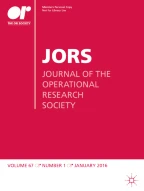Abstract
In the one-dimensional cutting stock problem with usable leftovers (1DCSPUL), items of the current order are cut from stock bars to minimize material cost. Here, stock bars include both standard ones bought commercially and old leftovers generated in processing previous orders, and cutting patterns often include new leftovers that are usable in processing subsequent orders. Leftovers of the same length are considered to be of the same type. The number of types of leftovers should be limited to simplify the cutting process and reduce the storage area. This paper presents an integer programming model for the 1DCSPUL with limited leftover types and describes a heuristic algorithm based on a column-generation procedure to solve it. Computational results show that the proposed approach is more effective than several published algorithms in reducing trim loss, especially when the number of types of leftovers is limited.
Similar content being viewed by others
References
Arenales M, Cherri A, Nascimento DN and Vianna A (2015). A new mathematical model for the cutting stock/leftover problem. Pesquisa Operacional 35(3):509–522.
Beeker KH and Appa G (2015). A heuristic for the minimum score separation problem, a combinatorial problem associated with the cutting stock problem. Journal of the Operational Research Society 66(8):1297–1311.
Belov G and Scheithauer G (2002). A cutting plane algorithm for the one-dimensional cutting stock problem with multiple stock lengths. European Journal of Operational Research 141(2):274–294.
Belov G and Scheithauer G (2006). A branch-and-cut-and-price algorithm for one-dimensional stock cutting and two-dimensional two-stage cutting. European Journal of Operational Research 171(1):85–106.
Belov G and Scheithauer G (2007). Setup and open-stacks minimization in one-dimensional stock cutting. INFORMS Journal on Computing 19(1):27–35.
Cherri AC, Arenales MN and Yanasse HH (2009). The one dimensional cutting stock problem with usable leftover—A heuristic approach. European Journal of Operational Research 196(3):897–908.
Cherri AC, Arenales MN and Yanasse HH (2013). The usable leftover one-dimensional cutting stock problem—A priority-in-use heuristic. International Transactions in Operational Research 20(2):189–199.
Cui Y (2012). A CAM system for one-dimensional stock cutting. Advances in Engineering Software 47(1):7–16.
Cui Y and Yang Y (2010). A heuristic for the one-dimensional cutting stock problem with usable leftover. European Journal of Operational Research 204(2):245–250.
Cui Y-P, Cui Y, Tang T and Hu W (2015). Heuristic for constrained two-dimensional three-staged patterns. Journal of the Operational Research Society 66(4):647–656.
Foerster H and Wäscher G (2000). Pattern reduction in one dimensional cutting stock problems. International Journal of Production Research 38(7):1657–1676.
Gilmore PC and Gomory RE (1963). A linear programming approach to the cutting-stock problem (Part II). Operations Research 11(6):863–887.
Gradisar M, Kljajic M and Resinovic C (1999a). A sequential heuristic procedure for one-dimensional cutting. European Journal of Operational Research 114(3):557–568.
Gradisar M, Resinovic C and Kljajic M (1999b). A hybrid approach for optimization of one-dimensional cutting. European Journal of Operational Research 119(3):719–728.
Gradisar M and Trkman P (2005). A combined approach to the solution to the general one-dimensional cutting stock problem. Computers & Operations Research 32(7):1793–1807.
Kellerer H, Pferschy U and Pisinger D (2004). Knapsack Problems. Berlin: Springer.
Moreira de Carvalho MA and Soma NY (2015). A breadth-first search applied to the minimization of the open stacks. Journal of the Operational Research Society 66(6):936–946.
Scheithauer G (1991). A note on handling residual lengths. Optimization 22(3):461–466.
Scheithauer G and Terno J (1995). The modified integer round-up property of the one-dimensional cutting stock problem. European Journal of Operational Research 84(3):562–571.
Valerio de Carvalho JMV (2005). Using extra dual cuts to accelerate column generation. INFORMS Journal on Computing 17(2):175–182.
Yanasse HH and Limeira MS (2006). A hybrid heuristic to reduce the number of different patterns in cutting stock problems. Computers & Operations Research 33(9):2744–2756.
Acknowledgments
This research is part of Projects 71371058 and 61363026 supported by the National Natural Science Foundation of China.
Author information
Authors and Affiliations
Corresponding author
Rights and permissions
About this article
Cite this article
Cui, Y., Song, X., Chen, Y. et al. New model and heuristic solution approach for one-dimensional cutting stock problem with usable leftovers. J Oper Res Soc 68, 269–280 (2017). https://doi.org/10.1057/s41274-016-0098-y
Received:
Accepted:
Published:
Issue Date:
DOI: https://doi.org/10.1057/s41274-016-0098-y
